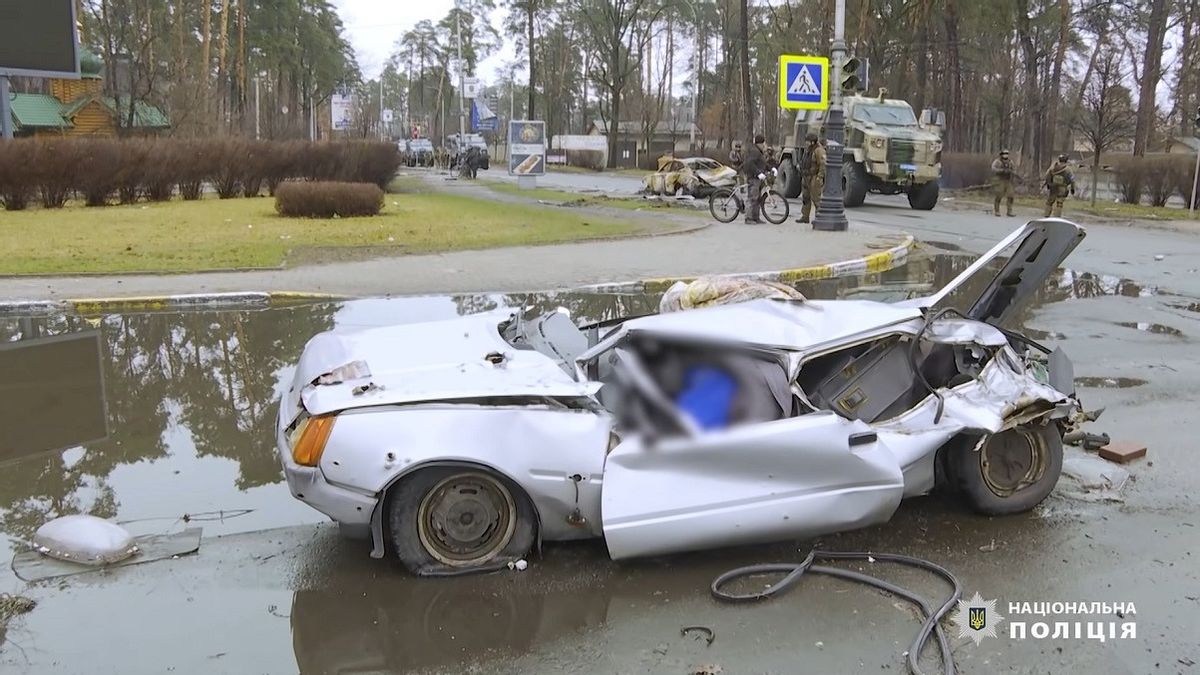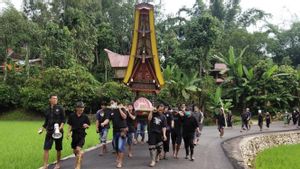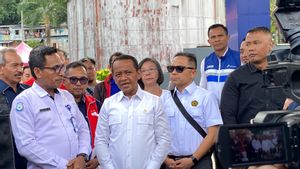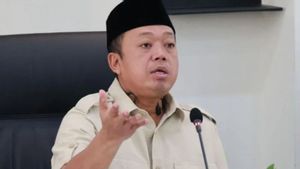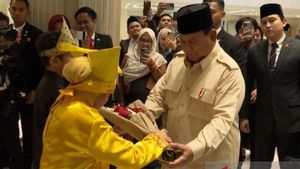JAKARTA - Located in a quiet, tree-lined neighborhood in the Ukrainian city of Bucha, an apartment complex on Vodoprovidna street features a well-trimmed promenade with pedestrian walkways.
Number 34a Vodoprovidna is one of the plots of a modern apartment building that goes back to kindergarten. The population is mostly middle class: Vasyl Nedashkivskiy, who installs PVC windows, lives on the fifth floor with his wife, Tetyana and their dog, Nika. Another resident is a child psychologist and the third, Oleksii Tarasevich, a nanotechnology engineer.
Russian soldiers arrived at the address just after noon on March 5, according to Tarasevich, who keeps a diary and video and photo recordings of what he saw from his apartment window. He shared the images and footage with Reuters, which verified that they were taken over the relevant time period.
A month later, 47-year-old Nedashkivskiy and another local resident were killed. Their mutilated bodies were found in the underground stairs of a building in the compound, while many of the complex's occupants have fled. In a resident's parking lot, a Renault Captur SUV and an Audi sedan lay upside down.
Records by at least a dozen residents of the complex paint a picture of violence and intimidation by soldiers while they were in the neighborhood. Nedashkivskiy had been severely beaten while unarmed, according to his wife and Tarasevich.
Nedashkivskiy's wife, Tetyana, told Reuters Russian soldiers found an automatic rifle hidden in their apartment after his beating in mid-March.
She said a soldier informed her that Russian troops then took her husband to an undisclosed location for questioning. Two weeks later, after Russian troops withdrew, neighbors found Nedashkivskiy's body, Tetyana said.
A photo of Nedashkivskiy's body reviewed by Reuters shows his face and hands having been crushed with what appears to be a blunt tool.
A second man was found dead on April 1 at the same place where Nedashkivskiy's body was found, according to Tetyana. The marks on the second man's body, seen by Reuters two days later, showed that he had been beaten and shot through the mouth at very close range.
Witness reports and videos compiled by Reuters also show Russian soldiers are concerned that although no Ukrainian military presence has been seen inside Bucha as of early March, they could still be targeted by drones or by combatants hidden among the population.
Video shows soldiers in full combat gear with cocked weapons, with Tarasevich saying they took blankets from the apartment to disguise their vehicle, and looking frightened and agitated.
The accounts also reveal acts of defiance by citizens who resent the invaders who occupied the city and their apartment complexes.

Bucha is located about 30 kilometers northwest of the center of the Ukrainian capital, Kyiv. Tarasevich said that before the Russian troops reached the city, he and Vasyl Nedashkivskiy had helped members of the Ukrainian territorial defense force, which consists of civilian volunteers, build barricades near the satellite town of Irpin in Kyiv.
Tarasevich said he was not a member of the territorial defense forces. Neither did Nedashkivskiy, according to his wife. The territorial defense officer in Bucha asked the deputy mayor a question, who did not immediately respond to a request for comment. The local number for the defense forces is also unanswered.
Even if Nedashkivskiy were a member of Ukraine's territorial defense forces, execution-style killings would still be considered a potential war crime under the 1949 Geneva Conventions, which set the legal standard for humanitarian treatment in conflict.
An individual act rising to the level of a war crime, if it has been committed as part of a broader plan or policy, is committed on a large scale during a conflict. Violent attacks against civilians, for example, may be considered war crimes if they are proven to be intentional or indiscriminate.
Russian troops began reaching Bucha on February 27, local residents said, a week before their arrival at the compound on Vodoprovidna road. There, they confiscated three apartments in one of the buildings, which they used as a command post, and also used the basement, Tarasevich said. Troops parked armored personnel carriers and military trucks in the courtyard of the apartment complex, images recorded by Tarasevich showed.
About 3.700 civilians lived in Bucha after the Russians arrived, the city's mayor said, or about a tenth of the city's population.
Troops ordered residents to wear white bands on their arms to identify them as civilians, eight residents told Reuters. The soldiers imposed a curfew every night, according to Tarasevich and Tetyana.
Soldiers searched the apartment, leaving a handwritten sign on the door that said in Russian: "Checked," Tarasevich said. When they find an empty apartment, sometimes they take its contents, he added. One photo he shared with Reuters showed an armored truck parked outside with what appeared to be a civilian gym bag strapped to the roof.

The soldiers also ordered local residents to hand over their mobile phones, at least 20 Bucha residents told Reuters. Tarasevich said he gave the soldier an old broken phone.
His real cell phone is hidden under his aged mother, who lives with him. He said he told soldiers he was too weak to get up, so they didn't search his bed.
Tarasevich said he kept ammunition in his apartment which he removed from a damaged Russian military vehicle on February 27, after it was attacked by Ukrainian forces. He said he had planned to turn them over to Ukrainian forces, but to no avail before the Russians arrived at the compound.
On the evening of March 17, Vasyl Nedashkivskiy arrived at the entrance of his building a few minutes after 5 p.m. curfew, according to his wife and Tarasevich, whose apartment is on the same floor as the couple. They said Nedashkivskiy was not wearing the white sleeve band required by the Russian army.
Both told Reuters they heard a rising voice from the ground floor. A soldier came to Tarasevich's apartment and pointed his gun at him, ordering him to get off, according to Tarasevich.
Tarasevich said he saw Nedashkivskiy lying motionless on the ground in a pool of blood, with at least three soldiers standing on top of him. Nedashkivskiy's face was covered in blood, and several teeth lay on the ground. A soldier ordered Tarasevich to wake Nedashkivskiy.
When he protested, the soldier pointed his gun at him and verbally threatened him, according to Tarasevich, who detailed his account in signed testimony reviewed by Reuters that he said he gave to the local prosecutor's office. Neither the prosecutor's office in Kyiv nor the local branch immediately responded to requests for comment.
Tarasevich said he helped Nedashkivskiy onto a bench near the entrance to the building. The soldiers then sent Tarasevich back to his apartment.
About two hours later, according to Tarasevich, he heard a sound on the floor and through binoculars at his door saw Nedashkivskiy, with several soldiers, enter the couple's apartment.
According to Nedashkivskiy's wife, the soldiers later found an automatic weapon, which was hidden under the television. She said her husband got it when, before Russian troops arrived, his acquaintances who served in Ukraine's territorial defense had left if any for safekeeping.
Soldiers took the couple to the command post, in building 33b, Tetyana said. There, a soldier hit her husband with the butt of his gun, he added. Tetyana said she was taken to a room, the children's bedroom, where she fell asleep. When she woke up, her husband was gone.
A soldier told him he had been taken for questioning at the unit's headquarters, without identifying his location, according to Tetyana. Reuters, during a visit to the building Thursday, observed drops of dried blood on the floor and walls leading out of the command post where he said they had been taken, and down the stairs.
After four days of being detained at the post, Tetyana said the army allowed her to go home. Her husband's body was found about a week later, on April 1, on the stairs leading to the basement of the building that houses the command post.
She said her husband had refused to submit to the will of the Russian army. "Vasya doesn't wear a white sleeve band," he said, using a loving version of his first name. "He said: 'I am on Ukrainian soil. I am Ukrainian'."

The Kremlin and Russia's defense ministry did not respond to detailed requests for comment on the deaths of the two men, events in the apartment complex described by residents, and Ukrainian allegations of the killing of Russian civilians in Bucha.
Russia denies deliberately targeting civilians following its February 24 invasion of Ukraine. Moscow launched what it called a "special military operation" in Ukraine, aimed at the demilitarization and "denazification" of Ukraine. Ukraine and the West say the invasion was illegal and unjustified.
Since Russian troops withdrew from Bucha last week, Ukrainian officials say hundreds of civilians have been found dead. The mayor of Bucha said dozens of people were victims of extrajudicial killings carried out by the Russian army. Reuters was unable to independently verify the figures.
Russian Foreign Ministry spokeswoman Maria Zakharova told a news conference on Wednesday that the images purported to show civilians killed in Bucha were fake and published to justify further sanctions by the West against Moscow, "to complicate, if not completely disrupt, (peace) talks."
The English, Chinese, Japanese, Arabic, and French versions are automatically generated by the AI. So there may still be inaccuracies in translating, please always see Indonesian as our main language. (system supported by DigitalSiber.id)
